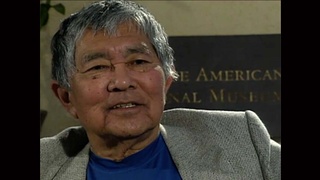Interviews
The only Japanese family in Ocean Park
My father was always a loner. He never lived within, like, the Japanese community. We were the only Japanese family at Ocean Park. So he was a loner in that respect so I don’t know if he experienced racism, although I’m sure he did because you know how terrible the laws were. But somehow, it didn’t…it wasn’t an issue until after he came back from Bismarck and after Manzanar and you know, he began drinking and, oh, it was like total change. And he never spoke to a Caucasian after that. He was quite bitter. Quite bitter.
Date: December 27, 2005
Location: California, US
Interviewer: John Esaki
Contributed by: Watase Media Arts Center, Japanese American National Museum
Explore More Videos

Being Confused about Racial Identity in Postwar United States
(b. 1932) Nisei American stage, film, and TV actress

Her brother’s reasons as a No-No Boy
(b. 1923) Japanese American poet, activist

Her grandfather was pressured to teach Japanese
Sansei judge on the Superior Court of Los Angeles County in California

Neighbor took care of her mother after grandfather was taken by FBI
Sansei judge on the Superior Court of Los Angeles County in California

Immediately after the bombing
(b. 1938) Japanese American. Hiroshima atomic bomb survivor

Other family members not as lucky
(b. 1938) Japanese American. Hiroshima atomic bomb survivor

His parents had little hope that he had survived the atomic bomb
(b. 1938) Japanese American. Hiroshima atomic bomb survivor

His views on nuclear weapons
(b. 1938) Japanese American. Hiroshima atomic bomb survivor

Loss When Leaving for Manzanar
Japanese American animator for Walt Disney and Hanna Barbera (1925-2007)

Forcibly deported to the U.S. from Peru
(b. 1936) Japanese Peruvian incarcerated in Crystal City

Stories of Grandfather at a concentration camp in Fusagasuga
(b.1974) Japanese Colombian who currently resides in the United States

Her grandfather in a concentration camp in Fusagasuga (Spanish)
(b.1974) Japanese Colombian who currently resides in the United States

Family welcomed at Crystal City
(b. 1936) Japanese Peruvian incarcerated in Crystal City

First meal at Crystal City
(b. 1936) Japanese Peruvian incarcerated in Crystal City

His sister Kiyo was like a second mother to him
(b. 1942) Japanese Peruvian incarcerated in Crystal City
